Cannabis in Pakistan
Cannabis in Pakistan
PAKISTANPakistan is one of the world's largest producers of hashish, much of which is trafficked via the Middle East and Central Asia to Europe, Africa and North America. Cannabis grows wild in many regions of the country; cultivation is widespread, and is believed to be increasing due to ongoing political and economic instability.
Pakistan is one of the world’s largest producers of hashish, much of which is trafficked via the Middle East and Central Asia to Europe, Africa and North America. Cannabis grows wild in many regions of the country; cultivation is widespread, and is believed to be increasing due to ongoing political and economic instability.
Law & International Policy
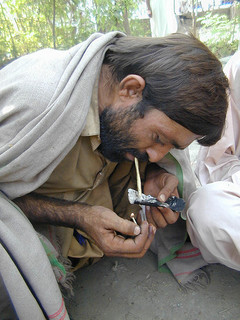
Cannabis is illegal in Pakistan, although its possession and use is far less likely to be penalised than that of ‘harder’ drugs such as heroin and amphetamines. On the other hand, drug trafficking and consumption are viewed as serious—and growing—problems, and Pakistan is under constant pressure from the international community to achieve greater control over the flow of illicit drugs transiting the country.
The organisation tasked with implementing Pakistan’s drug law and coordinating drug investigations abroad is the Anti Narcotics Force (ANF), established in 1995. In 2010, the Afghani, Iranian and Pakistani ministers for drug policy met in Islamabad and agreed to extend cooperation between the three countries, including improved sharing of information and mounting of joint patrolling operations in the border regions.
Cannabis Arrests & Sentences
In some parts of the country (particularly the northwestern tribal areas), laws prohibiting use of cannabis are infrequently enforced, and it may even be sold in public markets with no repercussion from authorities. However, in other regions such as Lahore and Islamabad, possession may be punishable by between six months’ and two years’ imprisonment.
The penalties for trafficking of cannabis and other narcotics are far more severe. Pakistan retains use of the death penalty, and according to law it may be applied to anyone convicted of trafficking over one kilogram of an illegal drug. In practice, death sentences are rarely applied for amounts of less than ten kilograms. In 2008, a moratorium on executions was imposed; this ended in 2012 as a single individual convicted of murder was put to death. Since then, no executions have occurred, but around 8,000 people remain on death row, many for drug offences.
In February 2013, ANF agents seized ten tons of hashish in a raid on a Karachi warehouse, however, no arrests were made. Also in February 2013, a provincial excise inspector was arrested in Karachi for possession of around 80 kg of hashish. In March 2013, police in Swabi district in northeastern Pakistan seized two tons of high-quality hashish destined for Punjab.
The Modern Cannabis Trade
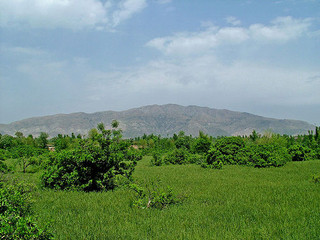
Due to its 2,430 km, porous border with Afghanistan, along with its vast tribal territories that exist outside of central government control, Pakistan is highly vulnerable to drug trafficking. Hashish, raw opium and heroin enter Pakistan through Afghanistan, and are shipped on to the Middle East, Europe and North America.
The southern coastline of Balochistan and the seaport of Karachi are crucial for transshipment of hashish and heroin destined for the Gulf States. Smuggling by sea is most common between April and June, and is lowest in July and August due to rough weather and excessive humidity, which can degrade hashish. In a typical scenario, a mother ship will anchor in deep water and smaller, high-speed craft will load and unload the hashish.
Land-based trafficking gangs operating out of Pakistan and Afghanistan are well-equipped, organised and brutally efficient. Movements of law enforcement agents are tracked using state-of-the-art communications equipment, and gangs often travel in multi-vehicle convoys with advanced weaponry, including anti-tank rockets and anti-aircraft missiles.
Cultivation of Cannabis
Cannabis grows wild in many rural areas of the country, and is cultivated almost as widely. The wild varieties of cannabis in the lowland regions are usually low in cannabinoids and may be either C. sativa or C. ruderalis; however, in the northern mountainous regions of the Hindu Kush and the Karakoram, high-cannabinoid C. indica strains may also be found.

Cannabis also grows freely in major cities such as the capital Islamabad and the second city Lahore, although cultivation is not widely practised in cities due to the increased presence of police. Osama Bin Laden’s compound in Abbottabad, a city in northeastern Pakistan, was reported to contain cannabis plants growing in a vegetable patch at the time of his discovery and execution in 2011.
In recent years, the possibility of legal hemp cultivation as a means to boost Pakistan’s struggling rural economy has been put forward in the media and in research. It is argued that hemp cultivation, which can be conducted on marginal land, could free up land needed for food production but currently used to grow cotton. However, there is no indication that the government has taken any steps to implement hemp-growing programs.
Cannabis in Pakistan’s Tribal Territories
The heartland of cultivation and traditional hashish production in Pakistan lies in the northwestern Federally Administered Tribal Areas—vast swathes of rugged, fertile terrain, beyond reach of central Pakistani authority and ideal for cultivation of cannabis and opium poppy. Opium is primarily cultivated in the Afghan tribal territories just across the border—which tribal populations can cross unchallenged, as can vast quantities of contraband—but it is estimated that at least 1,000 hectares of poppy fields are operated in Pakistan.
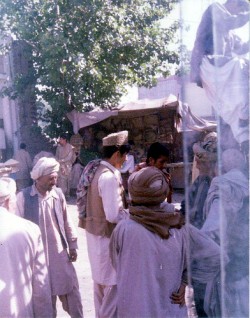
Tirah Valley in the mountainous Khyber Agency region has achieved minor renown for its vast cannabis fields and abundant hashish production. Jamrud, a small town known as the doorway to the Khyber Pass, has over 250 currently-operational hashish shops. In 2013, tribal conflicts over control of the region meant that many farmers could not venture into their fields to plant their crop, and the harvest suffered greatly. As a result, hashish prices have skyrocketed, from Rs20,000 (€140) for one kilogram before the conflict began to Rs50,000-65,000 (€350-€455) at present.
The tribal areas are out-of-bounds to foreigners unaccompanied by armed bodyguards, and the threat of violence and even kidnapping and ransom is always present. The tribal areas are home to various heavily-armed militias, and it is alleged that the proceeds of hashish produced for export are used to fund insurgency. In 2004, a boat crewed by suspected Al-Qaeda members was intercepted off the coast of Pakistan en route to the Gulf States and found to be loaded with almost two tons of hashish.
Hashish Production in Pakistan
There are several methods of hash-making in use in Pakistan, which are used to produce a range of hashish grades. Generally, the first stage of the process involves threshing the dried plants over a thin woven cloth to separate the ‘garda‘ (dried resin, or trichomes) from the unwanted plant matter.
One large-scale commercial method involves placing the garda in a metal pan with a small amount of water and gently heating it, while using a large stone or boulder to knead the pollen and encourage it to bond. Ghee, henna and other adulterants may also be added to the mixture, to facilitate bonding, or to increase weight or aroma.
A more traditional method is to place the garda directly into a goatskin, which is then stored for several months. The subdermal fat beneath the skin enables the bonding process, gradually turning the golden-brown garda into a sticky, greenish-brown mass. Reportedly, the flavour of the end product improves according to the length of time it is kept in the goatskin.
Smaller quantities of high-grade hashish are hand-made for personal consumption and local distribution, although some high-grade hashish may also be exported. Producers of high-grade hashish typically purchase good-quality ‘garda’ from growers and hand-press it into dark, sticky ‘eggs’ which may be of exceptional flavour and effect.
Cultural Use of Cannabis
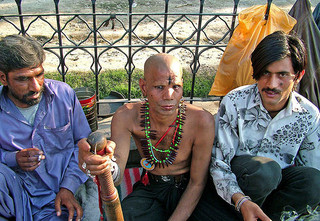
Pakistan has several religious communities, including Sufis and Hindus, that have used cannabis for centuries as a means to achieve euphoria and spiritual enlightenment. Their ability to do so has generally gone unchallenged by the Pakistani authorities. As well as smoking hashish in a chillum or similar device, cannabis is widely consumed in the form of bhang, a potent yoghurt-based drink that is associated with the worship of the Hindu god Shiva.
Aside from religious use, in some communities cannabis is used recreationally and is not socially prohibited. In contrast, alcohol is almost universally disapproved of, and its use is confined to foreigners and particularly Westernised Pakistanis. Traditional use of cannabis in medicine is also well-documented in Pakistan—for example, bhang is recorded as an effective treatment for dysentery. Cannabis use is equally widespread in both urban and rural areas; it is almost exclusively consumed by adult males.
Pakistan’s approach to cannabis has changed in recent decades. In the 1960s and ’70s, Pakistan was an essential stop-off point for travellers on the ‘Hippie Trail’ that snaked through Asia; cities such as Peshawar, Lahore and Karachi embraced the trend, and a thriving tourist culture sprang up. It was during this period that the famous hashish markets of Peshawar were established, and although they still thrive, control of the hashish stock has passed into the hands of organised militant groups. As a result, the government has stepped up efforts to combat trafficking.
Purchasing Cannabis in Pakistan
It is easy to obtain cannabis and hashish throughout Pakistan, although hashish is considerably more common than herbal cannabis. It is reported that police in many areas of Pakistan are willing to accept bribes in exchange for ignoring drug offences; however, this is never guaranteed, and it is advisable to avoid encountering police in most areas as they may be heavy-handed. However, if consuming cannabis discreetly in one’s own home, there is usually little risk of arrest.
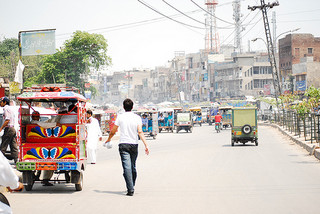
In Lahore, Jallo Park is well-known for its cannabis, which grows freely and can reportedly be obtained in large quantities in return for tiny sums paid to the gardeners. The city of Karachi’s Abdullah Shah Gazi Mausoleum, an ancient Sufi shrine, is also scene to regular ritual cannabis consumption in which mystics, devotees and interested onlookers are all welcome to take part; it is reported that watching police are more likely to respond to illicit public touching than to any cannabis-related issue. Occasional crackdowns do occur, but are usually dealt with by payment of bribes.
In many cities, street dealers will offer cannabis openly to passers-by, particularly those considered to be foreign or affluent in appearance. However, such dealers are often working in cooperation with corrupt police officials; after the transaction is made and the police alerted, the resulting bribe is split between the two parties. For foreigners in Pakistan, making discreet enquiries in local bars or among friends is the best means of ensuring a reliable source of cannabis or hashish.
The price for hashish (usually referred to as charas) and cannabis may vary somewhat between cities, and is often negotiable. The typical quantities purchased are known colloquially as a rod (five grams) or a tola (ten grams), and usually cost around €0.30-€0.40 per gram.
What Next for Cannabis in Pakistan?
As the hashish-making industry is so well-established and so crucial to the rural economy, it is likely that Pakistan will continue to produce significant quantities for the foreseeable future. Authorities are stepping up regional efforts to combat trafficking, but thus far it appears that the relentless flow of narcotics from Afghanistan and Pakistan has been marginally affected.
It is important to document the history and current events of the ongoing drug war that continues to affect the lives of so many people throughout the world. For this reason, Sensi Seeds and the Hash Marijuana & Hemp Museum in Amsterdam aim to provide the most accurate, up-to-date and unbiased information on the present situation, country by country. We welcome your comments, feedback and corrections.
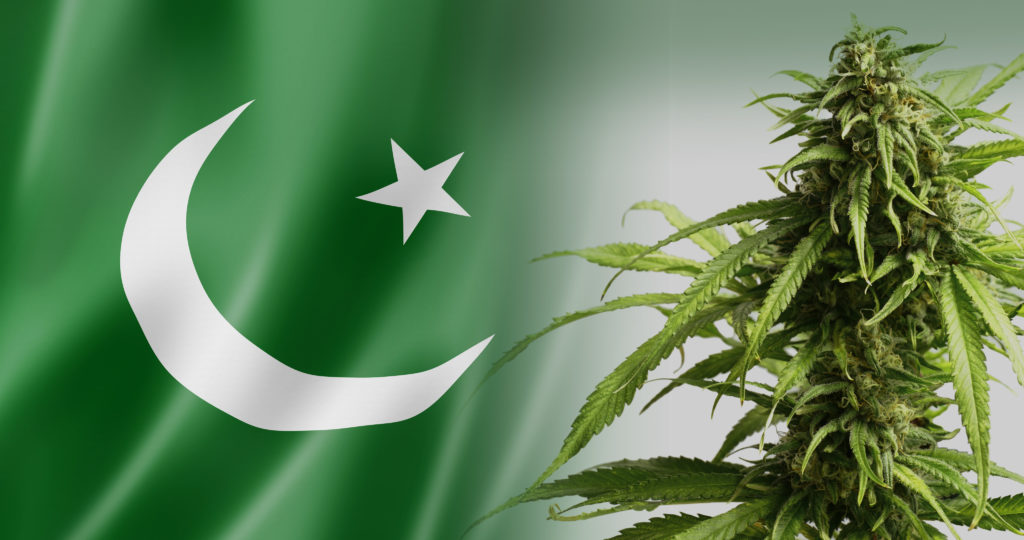
The rise of c liquid vape products, such as the Indica C Liquid vape, offers a smooth and enjoyable experience for those seeking relaxation. With benefits like stress relief and calming effects, this vape appeals to many. It's also a discreet option for those looking to unwind without the traditional methods.
ReplyDelete"Despite its long history, the conversation around regulation and medical use is only beginning to evolve." 🌿⚖️ dispensary in sandiego
ReplyDelete“You explained this in such a relatable way. It really helped simplify a topic I’ve struggled to understand before.”
ReplyDeletegrocery store racks